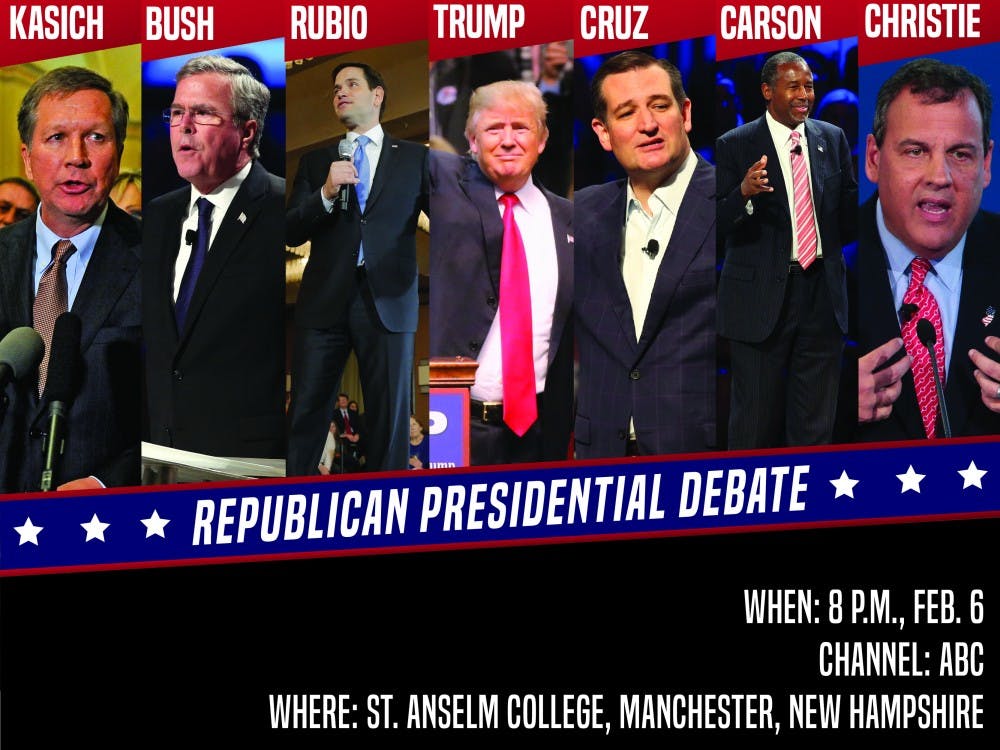Businessman Donald Trump, Sen. Ted Cruz (R-Texas), Sen. Marco Rubio (R-Fla.), retired neurosurgeon Ben Carson, former New Jersey Gov. Chris Christie, former Florida Gov. Jeb Bush and Ohio Gov. John Kasich debated Feb. 6 with foreign policy leading the discussion.
During the debate, Trump denied accusations that he would be the most militarily violent Republican candidate by responding that Cruz never answered the question of why Trump wouldn’t have the temperament to be Commander-in-Chief.
North Korea's test launching an intercontinental ballistic missile was the next topic of discussion that Cruz responded to. He blamed the crisis on former President Bill Clinton's loose sanctions. Trump suggested China should solve this problem because of its influence in the region.
Meanwhile, Christie expressed his frustration with Obama's willingness to pay ransom for United States citizens being held captive in North Korea.
“You need a strong Commander-in-Chief who will look these folks in the eye and say, 'We will not put up with this and we will take whatever actions we need to take,'” Christie said.
Cruz spoke out against Obama's ability in keeping U.S. citizens safe, citing a lack of military training for those who fight overseas.
“What we are doing to our sons and daughters, it is immoral. We are sending them into fight with their arms tied behind their back. They cannot defend themselves,” Cruz said.
Rubio suggested added he would be most effective in handling ISIS by developing a coalition of Sunni Iraqis and Syrians. Trump’s plans for defeating ISIS include taking their oil and destroying the circuit banking system connected with the terrorist organization.
Many of the candidates explained they would do everything within their powers to combat acts of terrorism, and even advocated for more extreme measures in addressing terrorist threats.
Cruz said he would utilize any necessary form of enhanced interrogation, citing waterboarding as a form of enhanced interrogation. Trump was even more confident in his stance.
“I would bring back waterboarding and I'd bring back a hell of a lot worse than waterboarding,” Trump said.
Rubio also supported increased use of torture and explained his plans to bring more individuals into Guantanamo Bay.
As focus shifted from international issues to national ones, immigration, campaign finance and birth control proved to be among the more highly contentious moments.
Regarding immigration, Kasich said he supported locking the U.S. borders and having the 11.5 million immigrants in the United States be legalized but not become citizens. Cruz said he would eliminate sanctuary cities and welfare benefits for those who enter the U.S. illegally.
Like previous debates, Trump criticized Bush for accepting money from wealthy donors and lobbyists. After being booed by the audience during a conversation about eminent domain, Trump argued he would be best fit to serve as president because he has eliminated conflicts of interests by funding his own campaign.
“The RNC told us we have all donors in the audience," Trump said. "And the reason they're not loving me is I don't want their money."
While campaign finance was an important issue, one of the more noteworthy moments of the debate occurred when some candidates explained their views on abortion.
After confirming that he was pro-life, Rubio questioned why Clinton has yet to be interrogated about her support for partial-birth abortions.
Bush held a slightly different stance on this issue than his opponents.
“I'm pro-life, but I believe there should be exceptions — rape, incest and when the life of the mother is in danger,” Bush said.
Christie said he is also more flexible on allowing abortions when rape and incest are involved.
The next Republican debate will be held at 9 p.m. Feb. 13 in Greenville, South Carolina.


